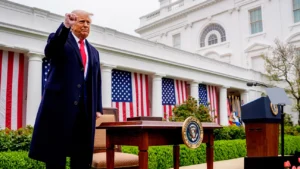In a significant move during the intensifying U.S.-China trade war, former President Donald Trump made the strategic decision to exempt smartphones, laptops, and a range of consumer electronics from a new wave of tariffs on Chinese goods. The announcement came as part of a broader strategy to manage economic pressures at home while continuing to leverage tariffs as a tool of negotiation abroad.
This decision, made during a particularly heated period of trade negotiations between the world’s two largest economies, reflects a balancing act between economic nationalism and domestic economic stability. As tensions soared and markets reacted nervously to escalating threats of tariffs on nearly all Chinese imports, Trump’s decision to delay or remove tariffs on specific electronic goods was seen as a measured response to avoid triggering a deeper economic backlash.
Background: The Trade War and Tariff Escalation
Since the beginning of the trade war in 2018, the Trump administration imposed several rounds of tariffs on Chinese imports, citing unfair trade practices, intellectual property theft, and a significant trade imbalance. The administration’s approach aimed to pressure China into agreeing to structural reforms in its trade and industrial policies.
However, the broad and aggressive use of tariffs quickly began to affect U.S. businesses and consumers. Companies relying on Chinese supply chains faced rising production costs, while consumers braced for increased prices on everyday goods. Among the most high-profile concerns were electronics—particularly smartphones and laptops—that are heavily dependent on Chinese manufacturing.
Strategic Exemptions and Their Rationale
In August 2019, amid market volatility and mounting concerns from American tech giants like Apple and HP, Trump announced that the U.S. would delay tariffs on a list of Chinese goods, including cellphones, laptop computers, video game consoles, certain toys, computer monitors, and some footwear and clothing. This decision postponed the imposition of 10% tariffs on roughly $300 billion in Chinese imports, initially scheduled to take effect in September of that year.
The rationale behind the exemptions was twofold:
- Minimizing Consumer Impact Ahead of Holiday Season
The tariff delay conveniently pushed potential price hikes beyond the crucial holiday shopping season. Given that many electronic devices are in high demand during the final quarter of the year, imposing tariffs would have led to significant price increases for consumers, potentially slowing retail sales and hurting the broader economy. - Alleviating Pressure on U.S. Tech Companies
Leading tech firms had voiced strong concerns over the tariffs’ impact on their bottom lines. Apple, for example, had argued that tariffs would place U.S. companies at a disadvantage compared to global competitors not subject to such duties. Trump’s decision was seen, in part, as a nod to these concerns and an attempt to maintain the competitiveness of American tech firms.
Economic and Political Implications
Trump’s tariff strategy was always a tightrope walk—balancing the aggressive pursuit of trade reform with the need to avoid domestic economic fallout. The exemptions on electronics served as a pressure valve, allowing the administration to continue talks with China while mitigating some of the pain felt at home.
Politically, the move also reflected sensitivity to voter sentiment. With the 2020 presidential election on the horizon, Trump’s economic approval ratings were closely tied to consumer confidence and market performance. A tariff-induced economic slowdown or a sharp increase in consumer prices could have undercut one of the administration’s key talking points: a strong and growing economy.
Reactions from Industry and Markets
The response to the tariff exemptions was largely positive from Wall Street and the business community. Tech stocks rallied on the news, with companies like Apple and Microsoft seeing immediate upticks in share value. Retailers also welcomed the move, relieved that the potential spike in prices would not deter holiday shoppers.
Trade groups such as the Consumer Technology Association praised the administration for recognizing the unintended consequences of blanket tariffs, emphasizing the importance of high-tech imports to American innovation and competitiveness.
Critics Weigh In
Despite the short-term relief, critics argued that the tariff exemptions were a tacit admission of the policy’s negative impact on American consumers and businesses. Some analysts suggested that the inconsistent application of tariffs created uncertainty in global markets, undermining long-term investment and planning.
Others pointed out that the exemptions weakened the administration’s bargaining position by signaling to China that the U.S. was not willing to endure the full economic consequences of its own trade war. In their view, the delay diluted the pressure on Beijing to make substantial concessions.
Looking Ahead: What the Exemptions Meant for the Trade War
While the electronics exemptions offered a temporary reprieve, they did not mark the end of the trade conflict. The Trump administration continued to press China for a comprehensive deal, resulting in the Phase One trade agreement in early 2020. However, many core issues—such as subsidies to state-owned enterprises and cybersecurity concerns—remained unresolved.
The electronics exemption episode highlighted the complexities of global trade interdependence. While tariffs may serve as a blunt instrument for pursuing trade goals, the ripple effects often boomerang back to affect the domestic economy. Trump’s decision to spare smartphones and other key electronics from tariffs underscored the recognition of these realities, even within an administration otherwise committed to a hardline trade agenda.
Conclusion
Trump’s exemption of smartphones, computers, and other electronics from Chinese tariffs was a pivotal moment in the U.S.-China trade war—illustrating both the limits of aggressive trade policy and the economic intertwinement between the two nations. While intended to keep pressure on China, the move ultimately revealed the delicate balance required to shield the U.S. economy from self-inflicted harm. As trade policy continues to evolve under subsequent administrations, the episode serves as a case study in the real-world complexities of economic nationalism in an era of global supply chains.



